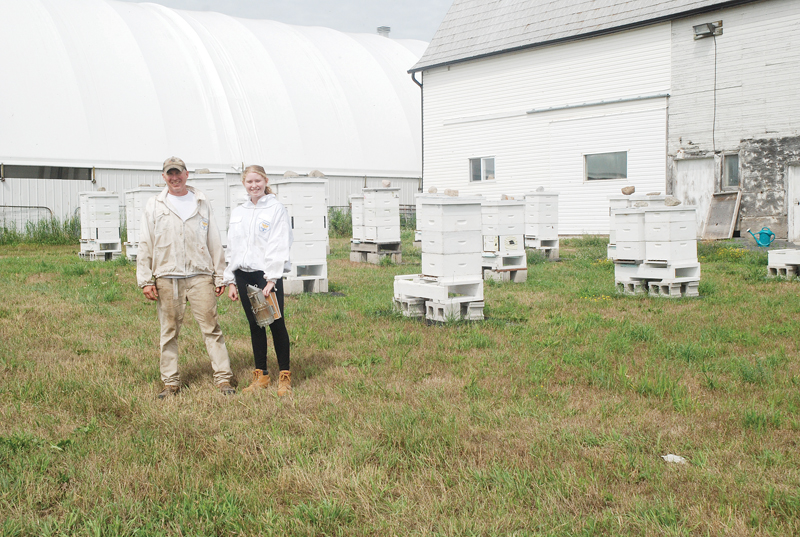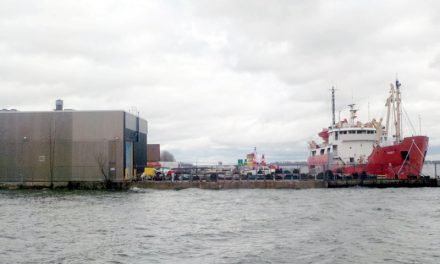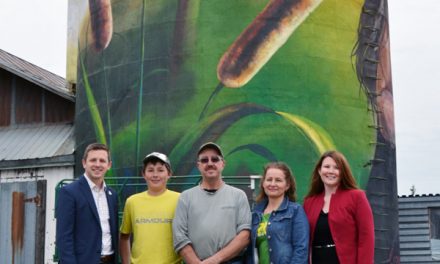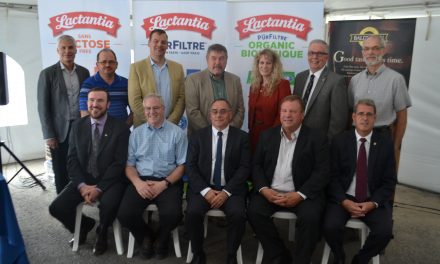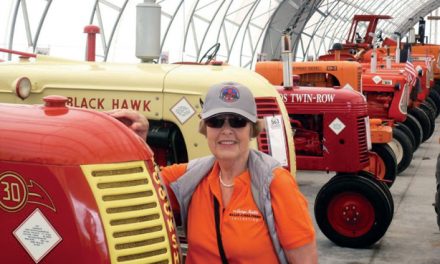Glenn and daughter Jada Smirle with their bee colony. Morin photo

Morin photo
MOREWOOD – If you are looking for something natural and sweet, a visit to Smirlholm Farms on the outskirts of Morewood in North Dundas will provide you the opportunity to learn about beekeeping and honey production. Local agriculturalist Glenn Smirle, together with wife Lisa and daughter Jada have been building a thriving honey operation since purchasing two beehives in the spring of 2017.
Smirle explained he has always been interested in beekeeping, and while studying agriculture at the University of Guelph, he took a beekeeping course. He continued how honey production took a back seat to running a successful, multigenerational dairy farm. Twenty-five years passed and in 2016 when the herd was sold, the idea of beekeeping returned to Smirle, which lead him to take a course at Algonquin College followed by the purchase of the initial two beehives in 2017. Smirle explained through hive splitting and purchases, the apiary currently has 30 hives and in 2019 produced just over 2000 pounds of honey for sale. Smirle commented with justifiable pride how Smirlholm Farms “was voted best honey by the Eastern Ontario Beekeeper’s Association” in 2019.
The honey produced by the bees at Smirlholm Farms is processed on site, with Smirle mentioning in a post interview email how the “processing is deliberately minimal” which is designed to ensure “that all the pollen and other benefits of the raw honey remains untouched.” When asked about government regulations he commented “the number of hives I have and the location of my bee yard(s) have to be registered with the government as well as ensuring specification for labelling which include name, phone number, address, size of jar and correct grade.
He has created a pollinator field from a rough ground area at the back of the farm which has been planted with native wildflowers and along some of his fields are rows of sunflowers that he currently cash crops on the acreage. Smirle mentioned how they are part of Operation Pollinator Program and members of the Ontario Soil and Crop Improvement Association.
While many are used to seeing bees buzzing around during the summer months, one often wonders what the bees are doing during the winter. Smirle explained how bees don’t hibernate, but rather they form themselves into a ball, flexing their wings while moving from the inside to the outside of the ball creating enough heat to keep the hive at 35 degrees Celsius with stored honey the food source. He continued how a beekeeper must ensure the bees have more honey than needed for winter activity, with the excess honey available for sale; which is accomplished by good beekeeping practices.
Smirle continued how during the winter season the hives are generally covered with insulator fabric around the hive and insulation on the top of the hive. It is important to ensure the hives are safely tipped a bit forward in order to ensure the hive is kept dry from the condensation created by bee activity.
When asked about his goals for the honey business, Smirle commented his interest in this field is currently honey production but has an eye for bee breeding in the future before discussing the agritourism aspect of the business. He sees Agritourism as a way people, both rural and urban, can learn more about agriculture and become more knowledgeable on where and how the food on their table is produced.
For more information on honey, beekeeping and Smirlholm Farms’ beekeeping business, please visit either their website at www.smirlholmfarmshoney.ca or their Facebook page.

